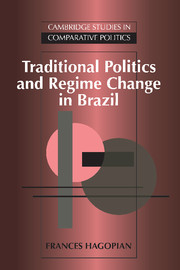Book contents
- Frontmatter
- Contents
- List of tables and figures
- Preface
- Glossary of abbreviations and Portuguese terms
- 1 Introduction: Traditional politics, new authoritarianism
- 2 Oligarchical power and traditional politics in Minas Gerais
- 3 The modern political economy of traditional politics
- 4 Bureaucratic authoritarianism and the state elite
- 5 Back to patronage: State clientelism in Minas Gerais
- 6 Authoritarian politics and traditional elites
- 7 The traditional political elite and the transition to democracy
- 8 Continuity in change: Brazilian authoritarianism and democratization in comparative perspective
- Appendix: The Minas elite
- References
- Index
6 - Authoritarian politics and traditional elites
Published online by Cambridge University Press: 06 January 2010
- Frontmatter
- Contents
- List of tables and figures
- Preface
- Glossary of abbreviations and Portuguese terms
- 1 Introduction: Traditional politics, new authoritarianism
- 2 Oligarchical power and traditional politics in Minas Gerais
- 3 The modern political economy of traditional politics
- 4 Bureaucratic authoritarianism and the state elite
- 5 Back to patronage: State clientelism in Minas Gerais
- 6 Authoritarian politics and traditional elites
- 7 The traditional political elite and the transition to democracy
- 8 Continuity in change: Brazilian authoritarianism and democratization in comparative perspective
- Appendix: The Minas elite
- References
- Index
Summary
When the military turned to the oligarchy to produce popular endorsements for the regime at the polls, it reluctantly accepted as allies members of the traditional political elite that its Médici wing had once hoped to replace. A new, perhaps more honest, competent, and above all loyal elite was an attractive prospect to hard-line military governors in the first decade of military rule. In choosing governors and national cabinet ministers from outside the state political machines, President Médici had tried to create just such a class. But with electoral majorities crumbling, his successors abandoned those efforts. Why the military rulers did not back a new, more loyal political elite with more determination and less ambivalence, why the efforts they did make at replacing this elite were largely ineffective, and why aspirants to a new political elite could not take advantage of the political disruption of an authoritarian regime are not self-evident. These questions are particularly puzzling since the military ultimately controlled state resources and, one might reasonably expect, should have been able to favor with federal patronage the candidacies of politicians of its own choosing.
The answer to why the traditional political elite and traditional politics persisted under military rule in Brazil is explored in this chapter in the context of the circumscribed nature of political competition during the authoritarian regime. Authoritarianism in Brazil did not “freeze” voter loyalties and the position of political leaders per se; party activity and participation in elections was actively encouraged by the Brazilian military.
- Type
- Chapter
- Information
- Traditional Politics and Regime Change in Brazil , pp. 178 - 210Publisher: Cambridge University PressPrint publication year: 1996

